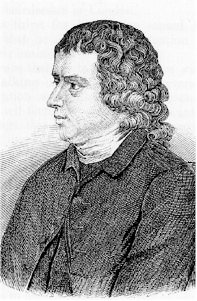Related Research Articles

John Taylor (1694–1761) was an English dissenting preacher, Hebrew scholar, and theologian.
Isaac Maddox was an Anglican clergyman, successively bishop of St Asaph and of Worcester.

Joshua Toulmin of Taunton, England was a noted theologian and a serial Dissenting minister of Presbyterian (1761–1764), Baptist (1765–1803), and then Unitarian (1804–1815) congregations. Toulmin's sympathy for both the American (1775–1783) and French (1787–1799) revolutions led the Englishman to be associated with the United States and gained the prolific historian the reputation of a religious radical.

Robert Robinson was an English Dissenter, influential Baptist and scholar who made a lifelong study of the antiquity and history of Christian Baptism. He was also author of the hymns "Come Thou Fount of Every Blessing" and "Mighty God, while angels bless Thee", the former of which he wrote at age 22 after converting to Methodism. The latter was later set to music by Dr John Randall, Music Professor at Cambridge University.
The dissenting academies were schools, colleges and seminaries run by English Dissenters, that is, those who did not conform to the Church of England. They formed a significant part of England's educational systems from the mid-seventeenth to nineteenth centuries.
Samuel Clark (1684–1750), usually known as Samuel Clarke of St Albans was an English Nonconformist pastor and theological writer, known for his Collection of the Promises of Scripture. He is not to be confused with his near contemporary Samuel Clarke (1675–1729), philosopher and Anglican clergyman.
Hugh Farmer was an English Dissenter and theologian.
George Benson was an English Presbyterian pastor and theologian who was noted for his publications on the Christian epistles.

Joseph Towers was an English Dissenter and biographer.
William Coward (1648–1738) was a London merchant in the Jamaica trade, remembered for his support of Dissenters, particularly his educational philanthropy.
David Jennings (1691–1762) was an English Dissenting minister and tutor, known also as the author of Jewish Antiquities.
Richard Amner (1736–1803) was an English Presbyterian divine.
John Barker (1682–1762) was an English presbyterian minister.
Samuel Bourn the Younger was an English dissenting minister. He was an English presbyterian preaching on protestant values learned from the New Testament. Through his published sermons, he entered the theological debate that flourished around the Arian controversy, and the doctrinal question as to Man's essential nature. He contested the Deism of the Norwich rationalists in the early enlightenment, and challenged the Trinitarian conventional wisdoms about the seat of humanity and its origins.
John Guyse (1680-1761) was an English independent minister.
William Harris, D.D. (1675?–1740) was an English Presbyterian minister.
Samuel Palmer (1741–1813) was an English nonconformist minister, known as a biographer.

Reverend Samuel Rosewell was a Presbyterian minister born at Rotherhithe, Surrey.

John Kentish was an English Unitarian minister.
Abraham Taylor, was an English Independent minister and dissenting academy tutor, known as a controversialist.
References
- 1 2 . Dictionary of National Biography . London: Smith, Elder & Co. 1885–1900.
- Attribution
![]() This article incorporates text from a publication now in the public domain : "Gibbs, Philip". Dictionary of National Biography . London: Smith, Elder & Co. 1885–1900.
This article incorporates text from a publication now in the public domain : "Gibbs, Philip". Dictionary of National Biography . London: Smith, Elder & Co. 1885–1900.